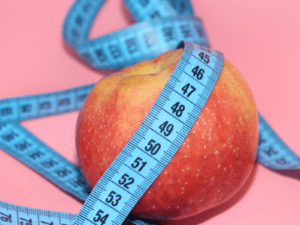
What happens when your pursuit of healthy eating collides with emotional eating—or even bingeing? Sometimes, all hell breaks loose.
We’ve been told that emotional eating is the absolute worst, haven’t we? That it’s something to be controlled, avoided, and eliminated. After all, where’s the “healthy” in eating emotionally? Where’s the discipline? Where’s the diet plan?
But what if emotional eating wasn’t the villain in this story? What if it was normal—healthy, even?
And what if the pressure to eat “clean” and healthy all the time is actually what leads to eating out of control? Spoiler alert: bingeing isn’t emotional eating—it’s something else entirely.
These are just some of the questions Deb and I dig into in the latest episode of the Escape Diet Prison Podcast. We share our experiences with emotional eating, healthy eating, and bingeing—and why one of these is more dangerous than the others.
What Is Emotional Eating?
Emotional eating is when food becomes a way to cope with emotions instead of satisfying hunger. Whether it’s stress, sadness, boredom, or even joy, emotional eating is often a psychological response to feelings we don’t know how to process in other ways.
And guess what? Emotional eating isn’t inherently bad—it’s human.
When Healthy Eating Goes Too Far
Here’s where things get tricky. When the desire to eat “perfectly” becomes obsessive, it can spiral into restrictive eating. This rigid approach can leave you physically and emotionally deprived, setting the stage for bingeing behaviors.
Bingeing isn’t emotional eating. It’s the body’s desperate attempt to make up for the deprivation caused by over-restriction.
Why Restriction Leads to Bingeing
- The Cycle of Deprivation and Craving:
When you tell yourself certain foods are “off-limits,” those foods become more desirable. - Biological Rebellion:
Your body fights back against restriction by triggering intense cravings to protect itself. - Emotional Fallout:
The shame and guilt from bingeing often lead to renewed attempts at restriction, perpetuating the cycle.
The Psychology of Eating Out of Control
Here’s the real irony: it’s not emotional eating that causes chaos—it’s the belief that we need to control everything about our eating habits.
When we demonize certain foods or behaviors, we create the conditions for bingeing and emotional distress around food.
Shifting Your Relationship with Food
To break free from this cycle:
- Embrace Emotional Eating as Normal:
Allow yourself to acknowledge and honor your emotions without judgment. - Let Go of Perfection:
Healthy eating doesn’t mean perfect eating. Flexibility is key to a balanced relationship with food. - Learn the Difference Between Emotional Eating and Bingeing:
Emotional eating is about soothing emotions; bingeing is often a response to restriction. - Model Self-Love for the Next Generation:
Kids don’t overthink their eating—they eat when they’re hungry and stop when they’re full. Let them inspire you to trust your body again.
Your Relationship with Food Can Change
If you’re feeling trapped by the cycle of dieting, bingeing, and emotional eating, know this: you’re not alone. Your situation isn’t hopeless, and change is possible.
Your relationship with food and your body doesn’t have to be a battle. With the right tools, mindset shifts, and self-compassion, you can find freedom.
Listen to the Episode
In this episode of the Escape Diet Prison Podcast, Deb and I share insights about emotional eating, the dangers of restrictive healthy eating, and the stigmas surrounding food and body image. Join us to learn how to step off the diet rollercoaster for good.
Podcast: Play in new window | Download (Duration: 1:03:34 — 58.5MB) | Embed
Subscribe: Apple Podcasts | Amazon Music | Email | RSS | More







